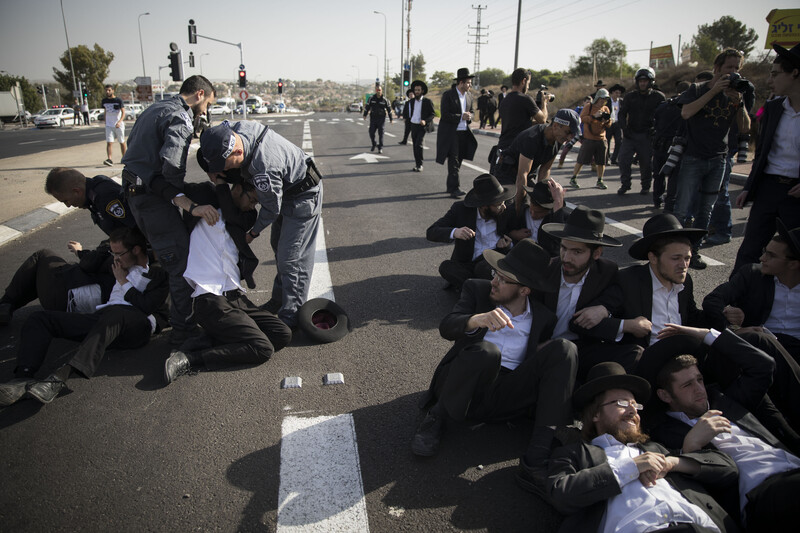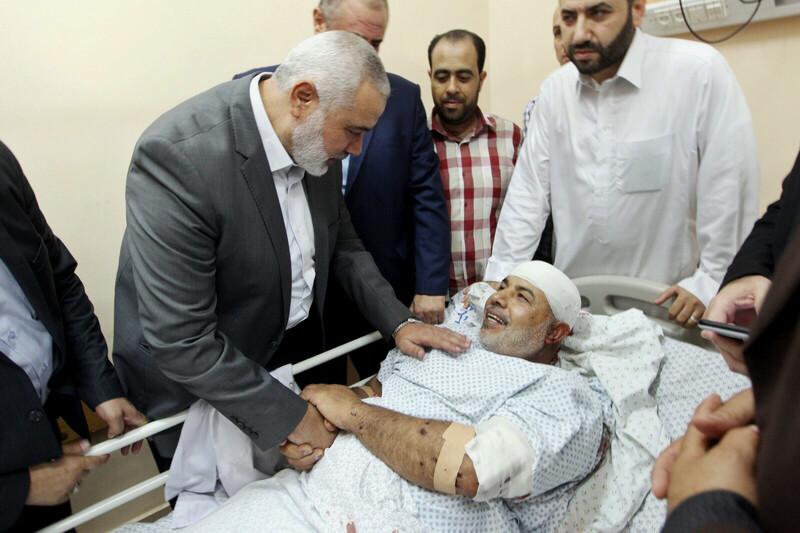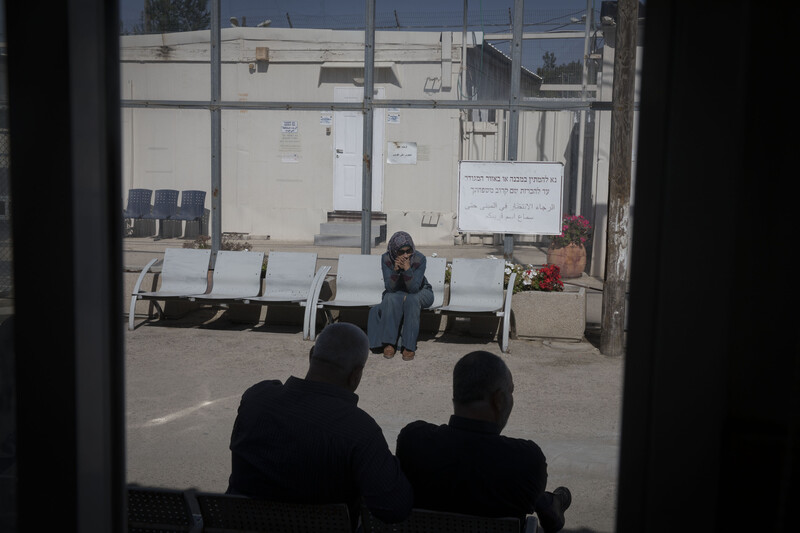The Electronic Intifada 3 November 2017

Palestinian mourners in Bureij refugee camp carry the bodies of three fighters killed when Israel detonated a tunnel along its boundary with Gaza, 31 October.
APA imagesDuring the month of October a Palestinian man was shot and fatally wounded by Israeli soldiers while driving in a car with his sister in the central occupied West Bank. The Palestinian Authority accused Israel of “extrajudicially executing” Muhammad Musa, 26, whose sister Latifa, 33, was also shot and injured.
In a separate incident, a Palestinian man was shot and critically injured by soldiers as he ran across a highway. Video shows that the man appeared to pose no immediate danger when he was shot.
Twelve Palestinian fighters were killed when Israel detonated a tunnel along its boundary with Gaza. An Islamic Jihad military wing commander was among those killed. At least a dozen others were injured.
Hamas, who had two fighters killed in the tunnel demolition, accused Israel of attempting to scupper the Palestinian reconciliation agreement signed earlier in the month by the Islamist group and the Western-backed Palestinian Authority.
Three Palestinians from Gaza were abducted by suspected militants from the Sinai peninsula while working in a tunnel near the border with Egypt.
The body of a 70-year-old Israeli settler who was stabbed and killed was found in the town of Kafr Qasim, located in Israel. Israel arrested two Palestinians from the West Bank town of Qabatiya, saying the pair killed the man in revenge for Israel’s slaying of one of their friends from the village.
Seventy-one Palestinians have died by Israeli fire so far this year. Sixteen Israelis and a British national were killed by Palestinians in the same period.
The Israeli military raided Palestinian media outlets across the West Bank, barring and welding shut broadcasting stations in four cities under ostensible Palestinian Authority control.
Movement restrictions
Israel imposed 11 days of closure on the West Bank and Gaza Strip for the Jewish holiday of Sukkot, further limiting already highly restricted Palestinian movement from the territories.
At least two Palestinian farmers were injured, hundreds of trees were damaged and several tons of produce stolen by settlers during the annual olive harvest in the West Bank.
Rafah crossing, the sole point of exit and entry for the vast majority of Gaza’s two million residents, remained closed in October.
The United Nations monitoring group OCHA stated during the month that the movement of people to and from Gaza had declined to the lowest levels in two years.
“This has exacerbated the isolation of Gaza from the remainder of the [occupied Palestinian territories] and the outside world, further limiting access to medical treatment unavailable in Gaza, to higher education, to family and social life, and to employment and economic opportunities,” OCHA stated, adding that it also “impeded humanitarian operations.”
Syria
UNRWA, the UN agency for Palestine refugees, announced that it had reopened two of its six schools in Sbeineh camp, south of the Syrian capital, for the first time since December 2012.
The camp, which had a population of some 25,000 Palestinian refugees before the beginning of the war in Syria, was vacated after it became an arena of fighting in 2013 and had remained closed to civilians until late August, according to UNRWA.
“It is estimated that 2,500 Palestine refugee families have so far entered the camp,” the agency added. “It is expected that an additional 1,000 families will return to the camp in the coming months.”
A dozen Palestinians were reported to have died as a result of the ongoing war in Syria, including a baby who died due to lack of access to medical treatment in besieged Yarmouk refugee camp.
Two Palestinians, including a commander of a militia that fought against the Islamic State’s infiltration of the camp, were killed by sniper fire in Yarmouk during the month.
Other Palestinians died in battle and one Palestinian was reported to have died in Syrian government prison.

Palestinians gather at Erez checkpoint in the northern Gaza Strip as Palestinian Authority Prime Minister Rami Hamdallah’s convoy arrives on 2 October. Hamdallah made his first visit to the Gaza Strip for talks aimed at securing a rapprochement between Fatah and Hamas.
APA images
Gaza City’s al-Zafir tower, newly rebuilt after it was destroyed during the 2014 Israeli war on Gaza, 4 October.
APA images
Palestinians in the West Bank city of Hebron argue with Israeli soldiers during a 6 October protest demanding the reopening of the main road to Qalqas village, closed by Israel almost 17 years ago.
APA images
A Palestinian works at al-Adham flour mill in the Old City of Nablus, in the northern West Bank, on 10 October. The mill was founded in 1945 and workers there grind wheat and beans using the same manual tools and system as they did when it first opened.
APA images
A Palestinian farmer harvests dates from a palm tree in the central Gaza Strip on 12 October.
APA images
The Jerusalem wilderness of Wadi Ghar, east of the West Bank city of Bethlehem, photographed on 13 October.
APA images
The Milky Way stretches across the night sky above the Palestinian desert east of Jerusalem on 13 October.
APA images
Palestinian journalists in Gaza City protest in solidarity with their colleagues in the West Bank after multiple broadcasting offices were raided and welded shut by the Israeli military, 18 October.
APA images
Ultra-Orthodox Jews block a major intersection between Jerusalem and Tel Aviv during a protest against the detention of two community members who refused their military conscription orders, 19 October.
ActiveStills
Palestinian fishermen display their catch for sale in Gaza’s seaport on 19 October after Israel temporarily permitted access to waters up to nine nautical miles off of Gaza’s coast.
APA images
Palestinians celebrate during the opening of Al-Wataniya Mobile Palestine in Gaza City on 24 October. The phone company launched telecommunications services in the Gaza Strip after years of trying.
APA images
A Palestinian family cross through a gate in Israel’s wall separating the West Bank from Kafr Qasim, a Palestinian town in Israel, on 26 October. Palestinian agricultural land is on the “Israeli” side of the wall, and owners have to apply for permits from Israel to access it.
ActiveStills
The rubble of a demolished shack in the Bedouin village of al-Araqib in the Naqab desert, southern Israel, on 26 October following its demolition by Israeli authorities the day before. The Jewish National Fund is planting a forest on the lands of the Palestinian village, unrecognized by the Israeli government, which has razed it 120 times since 2010.
ActiveStills
Hamas chief Ismail Haniyeh visits Tawfiq Abu Naim, director general of Hamas’ internal security forces in the Gaza Strip, at a hospital in Gaza City on 27 October. Abu Naim was injured a day earlier when his car exploded in what the Hamas interior ministry called a failed assassination attempt.
APA images
Palestinians wait outside a military courtroom at Ofer prison near the West Bank city of Ramallah before hearings concerning their family members arrested by Israel, 29 October.
ActiveStills
A Palestinian girl holds up photos of Majd Oweida, a computer engineer from Gaza who was arrested by Israel in February 2016 while traveling to the West Bank for work, during a weekly protest to show solidarity with Palestinian prisoners held in Israeli jails outside the Red Cross offices in Gaza City, 30 October.
APA images

